Book contents
- Frontmatter
- Contents
- List of maps
- List of tables
- Preface
- Part 1 Bigoted Liberals
- 1 The Ḥaj, the mayor, and the deputy prime minister
- 2 Tale of two cities
- 3 To sell or not to sell
- 4 Differentiated space
- 5 The limits of liberal education
- 6 Reflexivity and liberalism
- Part 2 Resistance?
- Notes
- References
- Index
- Cambridge Studies in Social and Cultural Anthropolgy
6 - Reflexivity and liberalism
Published online by Cambridge University Press: 05 October 2010
- Frontmatter
- Contents
- List of maps
- List of tables
- Preface
- Part 1 Bigoted Liberals
- 1 The Ḥaj, the mayor, and the deputy prime minister
- 2 Tale of two cities
- 3 To sell or not to sell
- 4 Differentiated space
- 5 The limits of liberal education
- 6 Reflexivity and liberalism
- Part 2 Resistance?
- Notes
- References
- Index
- Cambridge Studies in Social and Cultural Anthropolgy
Summary
Surprise recruitment
In January 1989, as I was entering my second year of fieldwork in Natzerat Illit, the Palestinian residents were putting together their first ever bid for political representation in the municipal council. Determined to get a Palestinian elected to the municipal council, they formed an independent list of local candidates – an undertaking I discuss in some detail in chapter 9. All activists were united behind the need to attain ‘Jewish-Arab cooperation’ – a code for inclusion of Jewish Israelis in the official list of candidates.
A month-long chase after potential Israeli partners followed, in which the Palestinian activists held several meetings with representatives of leftof- centre Zionist parties, but all to no avail. The disappointing outcome was conveyed by the leader of the list in an election rally in January 1989. He gave an account of each of the frustrating encounters, gradually introducing his all-Palestinian audience to the new situation: cooperation with Israeli partners was not about to happen.
Then, out of the blue, one of his deputies turned to me with a direct and public proposition. ‘Well', he said, ‘what about you? You are officially a resident of the town, hence eligible for office, are you not? Why don't you stand with us?'
Seen in retrospect, the attempt to recruit me is perhaps understandable given the circumstances. I was, after all, the only Israeli interested in their project. I had attended meetings and rallies, laboriously and visibly taking notes. I regularly spent time with the activists, asking questions, expressing sympathetic views. And yet, the public suggestion that I should join their ranks took me by complete surprise. Here I was, four months before the termination of my fieldwork, being offered an unexpected opportunity to enter local politics.
- Type
- Chapter
- Information
- Overlooking NazarethThe Ethnography of Exclusion in Galilee, pp. 101 - 108Publisher: Cambridge University PressPrint publication year: 1997



